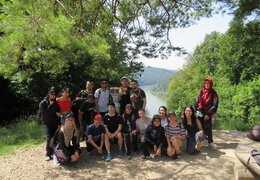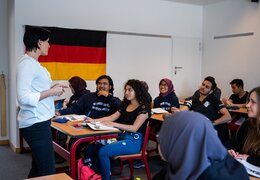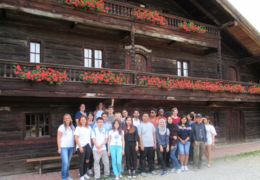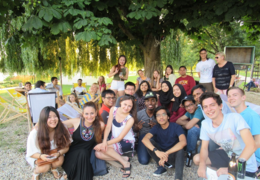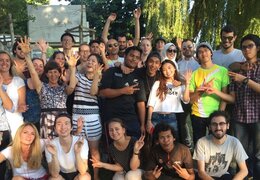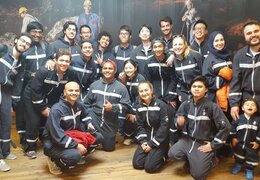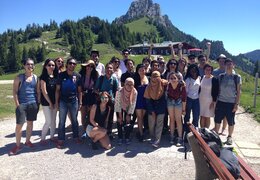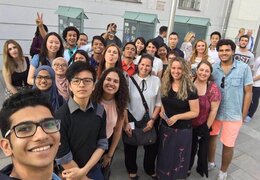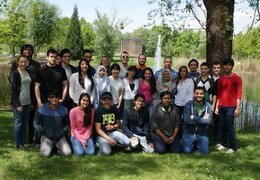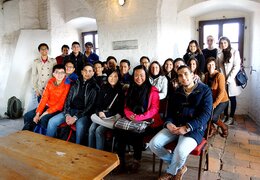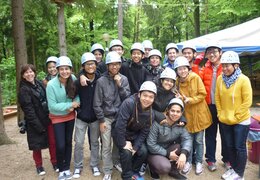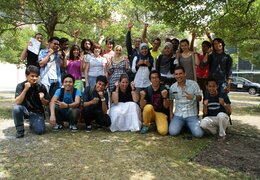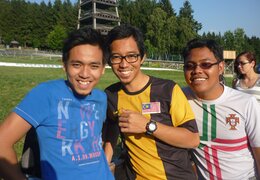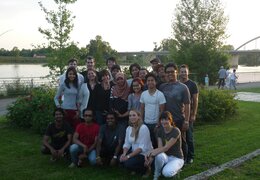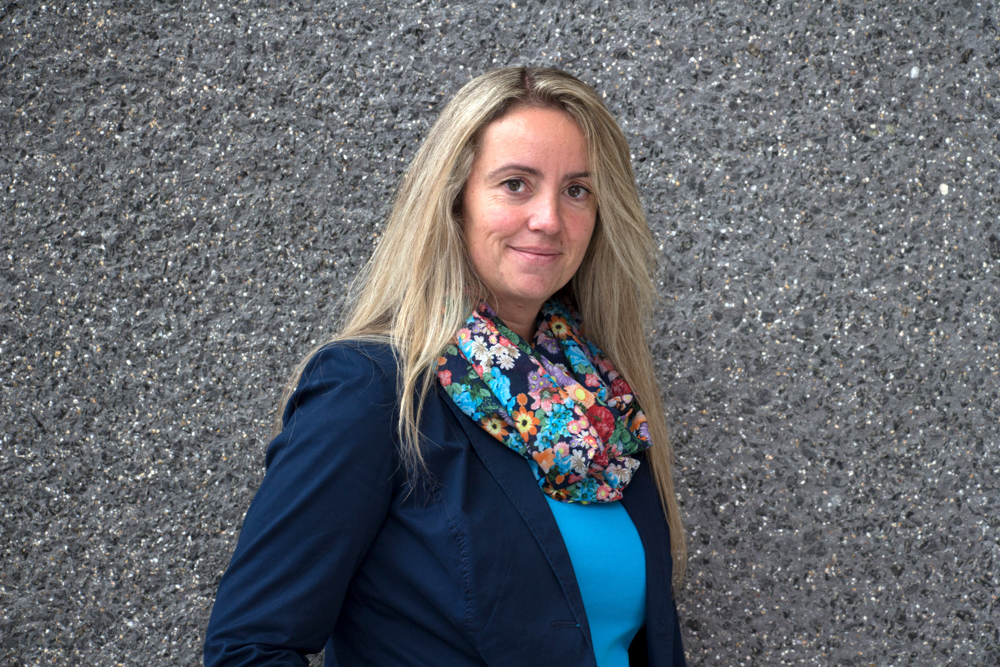dit students
you are pioneering and vibrant
Being confident and competent in a linguistically active manner in all environments is a necessary key skill essential for your future working life and in preparation for a study or internship abroad.
Meet the challenges of today's globalised world well prepared. We can supply you with:
- Language courses
- Elective classes
- A tandem language programme
- and lots more
overview of language and electives
Which degree programmes require AWP subjects and compulsory languages?
In almost every degree programme, one or more AWP subjects or so-called compulsory language courses must be taken by the end of the studies in addition to the regular classes. You can find out when AWP subjects and compulsory languages are scheduled in your degree programme not only from our overview, but also from the study and examination regulations that apply to you.
Each AWP subject and each compulsory language course may only be chosen once. For example, if you choose the same language for the second time, it must be different in content (title) or level from the first choice. In the end, the decisive factor is not when, but that you have completed ALL required AWP subjects and compulsory languages by the end of your studies.
electives
An elective (AWP) is a "compulsory elective subject of a general academic nature" prescribed by the study and examination regulations, which must be successfully completed. You can choose from the following three major areas:
- Methodological and Social Skills
- Orientational knowledge
- Languages
The range of subjects offered varies from semester to semester; not every subject is offered in every semester. Current courses can always be found in the Languages and Electives lecture schedule.
compulsory language courses
Like an elective (AWP), a compulsory language course is prescribed in the study and examination regulations for the respective course of study and must be successfully completed by the end of the studies. It comprises 2 - 4 ECTS points and counts to the overall grade point average.
voluntary subsidiary subjects
If you have already completed all the required electives (AWP)/ compulsory language courses or if your course of study does not include such subjects, you will of course have the opportunity to take these subjects on a voluntary basis – as long as there are free seats available.
Electives can always be chosen in the so-called “Restplatzwahl” at the beginning of the semester. There are NO ECTS points for these voluntarily taken subjects, they do not count to the overall grade point average.
It is not possible to "change" a voluntary subject into an elective (AWP) or a compulsory language course afterwards.
The grade of the subject you choose as elective (AWP)/ compulsory language course counts and cannot be changed afterwards.
The course becomes a compulsory subject upon selection and remains so until it is passed.
If you need to change your AWP subject, your compulsory language or the group within a course for important reasons, please send a short request with your matriculation number, your course of study, the courses and the reason to sprachenzentrum@th-deg.de.
Reasons for a course change:
- Lecture overlap with compulsory subjects or other AWP subjects
- Other university obligations
The following reasons can NOT be taken into account:
- Carpools
- Side jobs
- Other private matters
If you have already taken an exam in an elective or in a foreign language for another degree programme at this or another university, you can apply for a recognition of credits.
Please submit all documents required in accordance with the Checklist for the Recognition of Exam Performances to the Language Centre.
Please use the following form for the recognition of language and elective (AWP) courses: Request for recognition
Applications for the recognition of exam performances in the Language Centre must be submitted via email or personally to Iris Bubenhofer in office ITC2 2.35 no later than by the end of the lecture period of the study semester in which enrolment or a change in study programme took place (§ 4 IV 2 APO).
Vhb subjects can also be recognised under specific conditions. A possible recognition should be clarified in advance with Iris Bubenhofer.
lecture schedules
schedules for summer semester 2024 elective and language classes:
compulsory attendance
A language flourishes when it is heard and spoken. Therefore, all language courses require at least 75% lecture attendance to be permitted to the examination. Please read the general exam regulations section 4 art. 3.
75% attendance is …
... 9 absent times* for courses with 6 weekly semester hours
If this limit of absence is exceeded, the Centre for Studies will send an email to notify you of your examination exclusion.
It is not necessary to excuse absences. However, do make sure to keep medical certificates and other documentation justifying your absences until the end of the semester.
language and elective exams
Dates for examination registration are announced on the DIT website. As with other examinations, registration takes place via the Primuss portal.
Please pay attention to the type of crediting when registering:
AWP (2ECTS), compulsory language course (2/4 ECTS), voluntary subjects (no ECTS). A subsequent change is not possible!
admission requirements for language exams
Please note that a minimum of 75% attendance is required for admission to sit an exam, as stated in the general exam regulations section 4 paragraph no.3.
If you aim to repeat an AWP and language exam, the usual deadlines apply. A failed first attempt must be repeated no later than one semester after the exam results are announced, and a failed second attempt no later than 1 year after the results are announced. To sit the exam again, please register again for a so-called "repeat exam" with the same exam number during the exam registration period.
Since the attendance requirement was fulfilled in the previous semester, you can decide yourself if you attend. However, it is helpful to discuss the exam content with the respective lecturer in preparation for the exam, or participate in the last classes before the exam.
Lecturers can vary from semester to semester. The language lecturer for the current course writes and grades the repetition exam. If the courses or the classes aren't scheduled into the current semester, the repeated exam will be supplied by an appropiate teacher from the Language Centre.
language certificates
Deggendorf Institute of Technology is a licenced examination centre for TestDaF exams.
frequently asked questions
- When is the date of the next TestDaF exam?
Thursday, 06 June 2024
- How can I register for a TestDaF exam?
In order to register for the TestDaF exam, please contact the Language Centre at sprachenzentrum@th-deg.de.
- How much are the exam fees?
The fees are €210.00
- How can I prepare best for the TestDaF exam?
Training material as well as practice exams can be found on the website of TestDaF.
- What is TestDaF and who can participate?
TestDaF- test German as a foreign language – is an internationally accepted and worldwide standardized language exam offered by the TestDaF-Institute who examines language competencies on levels of B2/C1 (according to CEFR). The exam is directed towards those who already bear advanced knowledge of the German language as well as university applicants who are in need of a language certificate for their application. TestDaF also serves as proof of language proficiency in professional surroundings as well as for exchange students who want to acquire a language certificate at the end of their stay in Germany.
It is recommended to take the exam after a preparation period comprising about 800-1000 lessons. Our preparatory semester Let's get started can help you prepare for the exam as well.
- How is the TestDaF exam structured?
The TestDaF exam consists of the following sections:
- Reading comprehension (duration 60 mins)
- Listening comprehension (duration 40 mins)
- Written skills (duration 60 mins)
- Oral skills (duration 30 mins)
Each section is individually scored into one of these 3 levels:
- TestDaF Niveaustufe (level) 3: TDN 3
- TestDaF Niveaustufe (level) 4: TDN 4
- TestDaF Niveaustufe (level) 5: TDN 5
TestDaF certificates are recognized by all German universities. If participants obtain less than level 3 (U3), they have failed the exam and are not classified into a level. In this case, all sections of the exam must be repeated. The exam can be taken as many times as needed.
- Can I apply for a degree programme at a German university with the TestDaF certificate?
University applicants who have passed at level 4 or above, may apply for a German-based degree program.
In order to gain more information on the admission requirements of a certain program please have a look at the websites of the respective universities.
Deggendorf Institute of Technology is a licenced examination centre for telc exams.
frequently asked questions
- When is the date of the next telc exam?
10.05.2024 telc B2 in Deggendorf
29.06.2024 telc B2 at ECRI
27.07.2024 telc C1 in Deggendorf
- How can I register for a TestDaF exam?
In order to register for the telc exam, please contact the Language Centre at sprachenzentrum@th-deg.de.
- What is the exam registration deadline?
You need to register at least 31 days before the exam date.
- How much are exam fees?
The fees are €110.00 for B2 exams and €150.00 for C1-Hochschule exams.
- How can I credit sections of a previous exam to my new exam?
If a participant decides to repeat a failed telc exam, written or oral passed sections from the previous failed exam may be credited towards the new exam. The passed section from the previously failed exam do not need to be repeated. Previous results can only be credited for the same test (B1 for B1, B2 for B2, etc.) A credit of C1 for C1-Hochschule or vice versa is not possible. As crediting is only possible within a certain period of time, students must read the validity information on the back of their certificates.
No partial results from previous exams may be credited for B1-B2 Pflege, B2-C1 Medizin, B1-B2 Beruf and B2-C1 Beruf.
- How can I best prepare for the telc exam?
Training material as well as practice exams can be found on the website of telc.
- When should I be at Deggendorf Institute of Technology on exam day?
After exam registration, participants will receive a schedule by e-mail latest one week before the exam.
PLEASE NOTE: Keep the whole of the exam day free from other appointments.
- How do I receive my results and where do I pick up my certificate?
Exam results take approx. 4 weeks. The certificate can be picked up at the Test Centre when photo ID is shown, or the Language Centre can send it by post upon request.
- How can I receive the results earlier?
Unfortunately, this service is not offered.
- Can someone else pick up my certificate for me?
With a signed authorization from you and a copy of your ID you can have the certificate collected by a person you trust. The person must also show their own identity card.
- How long is my exam certificate valid?
Telc qualifications are valid indefinitely.
- Which telc exams are accepted as proof of German language skills to study German-based courses in Germany?
Both the telc B2 exam and telc C1 Hochschule are generally recognized as proof of language skills for studying in Germany. However, please inform yourself exactly about the individual requirements of your desired course of study.
Deggendorf Institute of Technology is a licenced examination centre for TOEIC exams.
frequently asked questions
- What is the date of the next TOEIC exam?
The next TOEIC Listening & Reading Test Online will take place on Wednesday, 14 June 2023, 03.00 pm
Compulsory trial exam: Wednesday, 31 May 2023, 03.00 pm
- How can I register for a TOEIC exam?
In order to register for the TOEIC exam, please contact the Language Centre at sprachenzentrum@th-deg.de.
Please note that the number of participants for TOEIC exams are limited and registration needs to be made at least one week prior to the exam date.
- How much are exam fees?
The fees are €130.00 (incl. Score Report) resp. €150.00 (incl. certificate).
- How can I prepare for the TOEIC exam?
Training material as well as practice exams can be found on the website of TOEIC.
- Where does the TOEIC apply?
TOEIC is a globally well-known English certificate. Exam questions are based on professional situations in the work environment and Business English.
- Is it possible to fail a TOEIC exam?
No. Depending on your proficiency, you can earn a total maximum of 990 points (a max of 495 points can be earned per section in listening and reading comprehension).
language offer
Course levels refer to the Common European Framework of Reference (CEFR).
compulsory attendance
A language flourishes when it is heard and spoken. All language courses require at least 75% lecture attendance to enter the exam. Please read the general exam regulations § 4 paragraph no.3.
75% attendance is …
... 9 absent times* for courses with 6 weekly semester hours
If this allowance is exceeded, the Centre for Studies will send an email to notify you of your exam exclusion.
It is not necessary to excuse yourself for absences incurred. However, do make sure to keep medical certificates and other testimonies which justify your absences until the end of the semester.
course descriptions
- Business English B1: English in Business Contexts
- Business English B2: Economy and Society
- Business English B2: English in Business Contexts
- Business English B2: Writing and Communication Skills
- Business English B2 (intensive course)
- Business English C1: Economy and Society
- Business English C1: Strategies and Management
- Business English C1: Writing and Communication Skills
- Business English C1 (intensive course)
- English in Technical Contexts B2
- General Technical English B1 (intensive course)
- General Technical English B2 (intensive course)
certificates
As part of the foreign language course accompanying your studies, you have the opportunity to earn a foreign language certificate in Spanish at DIT.
Prerequisites are the successful completion of a level, such as all parts of level A1. Your Spanish skills will then be tested in an oral exam.
If you are interested, please contact Dr. Virginia Wallner, the Spanish Coordinator.
DAAD language certificates are often required for the application of scholarships and studies or internships abroad, although they are are not internationally recognised qualifications. The exam is free of charge and consists of a 30 min test of your written and oral skills. On passing, the examiner will award you with your certificate. Please plan enough preparation time for your test.
Please direct your enquiries to:
For English: Jocelyn Flohr
For Spanish: Dr. Virginia Wallner
For French, Italian, Portuguese: Tanja Mertadana, head of the Language Centre
The DAAD website has the appropiate form for you to download, titled " Language Certificate for Candidates from Germany Applying for a DAAD Scholarship Abroad".
language trips
Language trip to Cork, Irland, 2018
07 - 17.08.2018: 10 students participated in English courses in Griffith College Cork partner university.
Language trip to Wrexham, Wales, 2016
04 - 17.09.2016: 14 students participated in English courses in Glyndŵr University partner university.
Language trip to Barcelona, Spanien, 2015
27 - 31.07.2015: 18 students participated in Spanish courses in Universidad Autónoma de Barcelona a partner university.
tandem
The Tandem programme offers you the chance to learn a foreign language in an intercultural and authentic way with a native speaker. You will be paired with one or more student(s) to teach each other your native language. Design your own programme and monitor your own progress, independent of a curriculum or textbook. In addition to the four language skills (listening comprehension, reading comprehension, oral and written expression), you will also develop intercultural skills. There is no specific location; participants can meet wherever they like: in the park or at home while cooking for example!
University blog report
Read "The Tandem Trick" in our university blog, written as a personal experience from an international student who immersed herself in the German culture by participating in the tandem programme and learning German.
Video report
View the video report from a tandem student below, which is spoken in Spanish with English subtitles.
You can register for the Tandem programme at the information event at the beginning of the semester, or simply register by e-mail tandem@th-deg.de.
Next information event: 21.03.2024, 1.00 pm, B 004
Register for the Tandem exam on iLearn during the regular exam registration period.
Exchange students earn ECTS credits and a certificate of participation if they successfully complete the Tandem programme.
Regular students who successfully complete the Tandem programme will only receive a certificate of participation.
1. Meet at least 11 times during the semester (at the same time on the same day)
2. Spend 45 minutes on each language per meeting, 90 mins in total
3. Keep a vocabulary list, at least 10 words per meeting should be learnt (a total of at least 110 words)
4. Keep notes of each Tandem meeting, including the summary sheet used and topics discussed. Download the summary sheet
5. Attend one of the two general Tandem meetings
6. Upload the vocabulary list and the summary sheet to iLearn or submit the documents via e-mail to tandem@th-deg.de at the end of the semester
recommended material:
German as a foreign language:
English:
Spanish:
French:
All of the above material is available in our library, among a selection of other language material (DVDs, CDs, Books, etc.).
theatre
The theatre is to attract international students to the German language. It gives them the opportunity to take part in a drama group and perform in a chosen German play, performed in German. All participants are incoming students who are learning German and have a love of language and drama. The theatre has been staged since 2014, view previous performances below.
If you are interested please contact Dr. Virginia Wallner.
The origin: Don Quijote de la Mancha
1605/1615 Miguel de Cervantes Saavedra
The plot revolves around the adventures of a noble from La Mancha named Alonso Quixano, who reads so many chivalric romances that he loses his mind and decides to become a knight-errant to revive chivalry and serve his nation, under the name Don Quixote de la Mancha. He recruits a simple farmer, Sancho Panza, as his squire, who often employs a unique, earthy wit in dealing with Don Quixote's rhetorical monologues on knighthood ...
The production: The Nobleman from the Mancha
In this production, Don Quixote is in the psychiatric ward of a hospital. He thinks the nurse is Sancho Panza and relives all his life's adventures with the nurse by his side ...
The doctor is not sure whether Don Quixote's abnormality is treatable, because he refuses to believe he is a patient ... but maybe it is not Don Quixote who needs help?
The myth of Bluebeard
A wealthy, old widower of a noble position with a blue beard is now looking for a seventh wife. Seduced by his wealth, a young woman leaves her family and marries Bluebeard. In his castle, Bluebeard lets her know that she has all the treasures and may enter all rooms. When he travels, he leaves the key to her. She is only denied access to a small chamber. However, the young woman cannot resist and enters the forbidden chamber where she finds the bodies of the six previous wives. Terrified, she drops the key, which now has a bloody stain that can no longer be removed. When Bluebeard returns, he looks at the key and realises what has happened, therefore he tries to murder his seventh wife. Luckily, she is saved by her brothers who hurry over, they murder Bluebeard and his widow inherits his fortune.
The production
The version created for this production is completely different as the original plot was used exclusively as a starting point. The Bluebeard story serves as a metaphor for the strength of all women who, despite all emancipations, still have to sometimes fight for freedom.
how to learn german
We have an extensive range of courses at levels A1 - C1, enabling you to develop and expand your German language skills and knowledge of the German culture.
- Semester courses
In addition to the regular language courses, which focus on reading, listening, writing and speaking skills, voluntary additional courses covering areas such as grammar and pronunciation, text production and conversation are available.
Additionally, the THEATRE or the Tandem programme are different ways to learn German and boost your language skills .
We also welcome the participation of non-students in regular language classes during the semester, as long as vacant places are available. The start is only at the beginning of the semester in unison with the students. If you are interested please contact the Language Centre at sprachenzentrum@th-deg.de.
- Intensive courses
Two week intensive courses regularly take place in lecture free periods throughout the academic year. The content of a 4-SWS regular semester course is covered, which corresponds to about 60 teaching units of 45 minutes each. Generally, the intensive courses run daily from 8am - 1pm, with an exam on the last course day. Find out more at intensive language courses - learning German.
- Compulsory attendance
A language flourishes when it is heard and spoken. All language courses require at least 75% lecture attendance to enter the exam. Please read the general exam regulations § 4 paragraph no.3.
75% attendance is …
… 3 absent days are accepted for courses with 2 semester hours per week
… 6 absent days are accepted for courses with 4 semester hours per week (unless the course is to be completed on one day)
If this allowance is exceeded, the Administration Centre will send an email to notify you of your exam exclusion.
It is not necessary to excuse oneself for absences incurred. However, do make sure to keep medical certificates and other documents to justify your absences until the end of the semester.
Please note that courses can vary from semester to semester.
- German A1/ part 1 + 2
- German A1/ part 3 + 4
- German A1/ Grammar and Vocabulary
- German A2/ part 1 + 2
- German A2/ part 3 + 4
- German A2/ Grammar and Vocabulary
- German B1/ part 1 + 2
- German B1/ part 3 + 4
- German B1/ Grammar and Vocabulary
- German B2/ part 1 + 2
- German B2/ part 3 + 4
- German B2/ Grammar and Vocabulary
- German B2/ C1 Text Production
- German B2/ C1 Conversation and Presentation
- German C1/ part 1 + 2
- German C1/ part 3 + 4
As non- enrolled guest students you can participate in language courses at DIT, although you will not have student status and therefore cannot sit any university exams.
intensive language courses
german as a foreign language
Two-week intensive courses regularly take place in lecture-free periods throughout the academic year. The content of a 4-SWS regular semester course is covered, which corresponds to about 60 teaching units of 45 minutes each. Generally, the intensive courses take place daily (not on Saturdays and Sundays), with an examination on the last course day.
- Information on German Intensive Courses at DIT
- Information on German Intensive Courses at ECRI
- Information on German Intensive Courses at Campus Cham
other languages
Intensive language courses are generally scheduled at the end of the semester break.
The content of a 2-SWS regular semester course is covered, which corresponds to about 30 teaching units of 45 minutes each. Courses take place daily (except Saturdays and Sundays) in the morning or afternoon, with an examination on the last course day. Further details about courses and application are sent via email 2 to 3 months before the courses start.
A complete overview with further information regarding lecturers, course material, etc. can be found in the following document: Information on Intensive Language Courses
exam schedule for intensive language courses (german & other languages)
For intensive language courses:
- Electives (2/ 4 ECTS)
- Compulsory languages (2/ 4 ECTS)
- Voluntary subjects (no ECTS!)
It does not make any difference in the credits which semester the course is taken in.
Please note, however, that intensive language courses cannot replace faculty language classes.
Registration is possible via the following link:
https://pmit-ext.th-deg.de/awp/login
Courses will be offered only to groups of 15 participants or more. Places are limited.
Non-students may participate in language courses as long as there are availbale places.
Registration: sprachenzentrum@th-deg.de.
- 2 SWS-courses:
- € 39 per week for students (including students from other universities) school pupils and apprentices.
- € 120 per week for non-students, including exam resistration and results. Non-students will recieve a receipt on payment.
- 4 SWS-courses:
- € 78 per week for students (including students from other universities) school pupils and apprentices.
- € 240 per week for non-students, including exam resistration and results. Non-students will recieve a receipt on payment.
More information will be provided in the confirmation email. The required course material is not included in the fees.
Grades are automatically printed on your grade sheet approx. 4 weeks after completion of the intensive course.
Registration is automatic and does not require prior exam registration via Primuss.
Upon passing the exam, guest students receive a certificate (by email or post) stating the exam grade.
Preparatory Language Courses
English
More details to follow soon!
Spanish
More details to follow soon!
Let's get started - German Prep Course
Let's get started.
German prep courses for international applicants.
`Let’s get Started´ is a preparational semester for international applicants, who have a university entrance qualification but an insufficient level of German for the admission to a German-based degree course. The programme aims to prepare these applicants for their studies in German and they are required a minimum GER level of B1 to enrol. DIT is an official examination centre, so students can easily take part in the required telc admission examinations at our campus examination centre in July, in preparation for the semester start in October.
SUBJECTs
- German as a foreign language (DaF), with more than 500 lessons in the mornings
- DaF Tutorials with over 80 lessons in the afternoons
- Technical tutorials (in mathematics, physics, and IT), during the afternoon (block lectures)
- Various workshops, such as intercultural trainings, team building, etc.
Download the Let's get Started flyer.
dates
Let's get started takes place annually during the summer semester from mid-March to August.
Start date for 2024: Thursday, 7 March
application
The application period is the 1 September of the previous year as long as there are capacities (limited number of participants).
If you wish to apply in advance, please contact Tanja Mertadana or sign-up online.
- Fadi Sami Snobar, Jordan
Before I came to Germany, I was looking for an intensive German course that would give me the opportunity to successfully start an engineering degree in Germany. I fond the "Let's get started" course in Deggendorf, which gave me exactly this opportunity. I attended the course from 15 March to 30 September 2015. During this time I not only got to know a lot of German but also many people from all over the world. In the winter semester 2015/2016 I started to study mechatronics at the Deggendorf Institute of Technology. Thanks to "Let's get started" the beginning of my studies was not that difficult, because we learned many scientific terms in the subjects mathematics, physics and computer science already in the course. I am now in my third semester and passed the previous semesters successfully.
- Catherine Tenorio Rodriguez, Colombia
After two semesters of General Engineering at DIT, I wanted to perfect my German by taking part in the preparatory semester "Let's get started". So I started the programme on 17 March, 2015. At the end of July I successfully passed the TestDaF exam. In October of the same year I started the study "Resources and Environmental Management" at DIT. I find this preparatory course with its practical learning methods by highly qualified professors very efficient. During the course, reading and listening comprehension are practised very intensively. In addition, great importance is attached to correct writing and speaking during the course. We were students from different countries and yet we always spoke German in class. I find that very important. Furthermore, there was always a great atmosphere in the course and it was great fun. So I can recommend "Let's get started" 100% to other students.
- Huai Zhe Chia, Malaysia:
I was informed by fellow students about the possibility of a German preparation course at the Deggendorf Institute of Technology. Therefore I completed the "Let's get Started" German preparation course in the summer semester 2016. I had mainly satisfying and wonderful experiences not only with the course but also with my whole stay here in Deggendorf. Personally, I think that the course is very well structured. The lecturers have helped us to practice the course materials intensively. For me the content of the course was interesting and informative. In addition, the lecturers are very friendly and helpful. I am infinitely grateful for them because without them I could not have passed the exam that well. Furthermore, the people here in Deggendorf are friendly and nice. I have had some unforgettable experiences and they have impressed me very much. At the moment, I'm studying full-time here at the university in the mechatronics course and so far I'm doing quite well. Nevertheless, I am very much looking forward to my student life here in Deggendorf. Above all, I feel very happy that I have the opportunity to study here.
- Krastyo Stoychev, Bulgaria
My name is Krastyo Stoychev and I come from Bulgaria. I came to Germany five years ago to study engineering. Since my German language skills were not sufficient, I first took part in the preparation course "Let's get started" in 2012. "Let's get started" gave me the right start for my studies. The comprehensive course programme not only improved my German language skills, but also taught me the basics in all the main subjects. Furthermore, "Let's get started" familiarised me with the German university system. In addition to the lessons, there were also numerous excursions and cultural events where you could see the sights of Germany. "Let's get started" was like a family for all participants because of the commitment and friendliness of the lecturers and organisers. Thanks to the preparatory semester, I successfully completed my Bachelor's degree Electrical Engineering within the standard period of study and currently I am continuing my studies in the master's degree at Deggendorf Institute of Technology. "Let's get started" - no other way leads faster to a successful study.
electives
course descriptions
Please note that the range of courses can vary from semester to semester.
- Achtsamkeitsbasierte Stressreduktion (MBSR)
- Bavarian Culture
- Personal and Professional Skills
- Communication & Rhetoric for Mentors
- Cross-Cultural Teambuilding Workshop
- Education 4.0 - Digital Innovation Units
- Volunteering
- Ethical Questions in international and intercultural Environments. Argumentation, Debate and Negotiations.
- Leadership Psychology
- Happiness - Wie Sie unvermeidlich glücklich werden
- Interkulturelle Kompetenzen
- Interkulturelle Sensibilisierung (Grundkurs)
- Interkulturelle Sensibilisierung - Länderspezifisch (Aufbaukurs)
- Intercultural Skills
- International Teambuilding
- Kommunikation und Rhetorik für Erstsemesterpaten und Mentoren
- Kompetenzen und Techniken der tutoriellen Betreuung
- Konflikt- und Teammanagement
- Medienkompetenz und Lernen in einer digitalen Gesellschaft
- MINT-Workshops mit Schüler:innen als Tutor:in
- Persönlichkeitskompetenzen für dual Studierende
- Problemlösungen in der Praxis
- Qualitative Research Methods
- Scientific Communication
- Strategie - und Projektmanagement
- Welcome@DIT
- Wissenschaftliches Arbeiten und Schreiben – Erfolgreich und effizient in Studien-, Bachelor- und Masterarbeiten
Courses are held either in English or German
- Asian Emerging Economies and Doing Business in the Asian Region
- Basics of International Sales and Business Development
- Basics of Management Consulting
- Business Analytics for Data-Driven Decision-Making
- Business and Society in China & Emerging Asia
- Business Storytelling
- Campus-Fernsehen mit NIEDERBAYERN TV
- Corporate Social Responsibility
- Der Mensch im Spannungsfeld von Gesellschaft, Politik und Medien
- EcoLab-News – News from Ecology and Economy
- ECRI-Band
- Einführung in die digitale Fotografie
- Einführung in die Elektronikproduktion
- Einführung in die FEM-Simulation einfacher physikalischer Probleme
- Einführung in die Produktion elektrischer Antriebe
- Fehlervermeidung in der Entwicklung
- Geschäftsmodelle entwickeln - Der Weg zum eigenen Startup
- Grundlagen der Bionik
- Grundlagen des Handelsmanagements
- Grundlagen des Marketing
- Grundlagen des Verkaufs
- Grundlagen des Vertriebs
- Gründungsmanagement
- GROW GründerAkademie (start-up academy)
- GROW GründerWerkstatt (start-up workshop)
- Introduction to Sound-Engineering
- Lehrredaktion NIEDERBAYERN TV
- Mathematics with Matlab
- Mental Disorders in Feature Films
- Präzisionsfertigung Optik
- Projekt Formula Student
- DIT-Big Band
- DIT-Theatre Group
In addition to the possibility of attending in-house courses at DIT, we would like to inform you about the courses offered by the Bavarian Virtual University (vhb). The vhb's online courses, which are flexible in terms of location and time, are available free of charge to enrolled students of Deggendorf Institute of Technology: https://www.vhb.org
Please note that only language courses and courses outside your subject area can be accredited – subject to case by case review. Please clarify any possible recognition of a vhb course as an elective (AWP) or compulsory language course in advance with Iris Bubenhofer.
impressions
(in German)
Report by Felix Sturm, Wintersemester 2020/2021
As part of the general science elective subject (AWP) "Ehrenamt ist Ehrensache" (Volunteering), students can get involved in one of eight social institutions in the Deggendorf district. Contact is made through the Deggendorf volunteer centre "mach mit". From the curative education day centre, the Kreisjungendring to the TSV, there is a lot to choose from. The AWP is open to all courses of study and includes 30 hours of work as well as a final study paper.
I decided to work for the Bavarian Red Cross and spent the main part of my 30 hours at TagWerk. This is a component of the social therapeutic services offered by the Bavarian Red Cross and the Deggendorf district association in Plattling. They provide low-threshold access and day-structuring services for people with mental disabilities through counselling centres, additional income projects and employment initiatives. The aim is to provide individual support, increase self-esteem and thus improve the quality of life in the long term. People can work in different areas, such as the food distribution, flea market or clothes shop, depending on their qualifications and interests, without having to compete in the primary labour market.
I mainly supported in the food distribution, the Tafel. There, people in need can receive a well-filled food basket every week for a small fee. To ensure that the food was available, we collected various foodstuffs from the food distribution from the surrounding supermarkets that were close to their expiry date or just over it. Seasonal goods such as fruit and vegetables with blemishes or bruises also go into the baskets. Thanks to the deposit donation system of the regional grocery shops, long-lasting goods also find their way into the baskets. By means of a lottery number principle, everyone has a fair chance to get hold of the food that is needed but not always available in sufficient quantities.
If you want to gain a wealth of experience that will accompany you throughout your life and want to give something back to society, I can recommend the AWP "Ehrenamt ist Ehrensache" (Volunteering). Especially during the Corona pandemic, when social contacts became scarce, and because it enabled me to get out of my daily university routine, I learned to appreciate it. Anyone can find themselves in a situation where they need help and support, so it's not embarrassing to ask for help. But it is even more important to give back when you can give. It doesn't always have to be a large sum of money, it's enough to press the "Tafelspende" button when returning a deposit. For me, it is the sum of small gestures that makes the difference.
additional vertificates
The Grow4Digital certificate accompanying the course is for students of all courses. In order to receive the "Grow4Digital" certificate, you must achieve at least 24 ECTS. You can put these together individually according to your interests, as long as you have successfully completed at least one course from different areas (digital technologies, innovation and digitization, start-up and growth and ICH development). The components mentioned are made up of courses from the various faculties and general sciencific elective classes. No special order is required for attending and completing these subjects.
Overview of individual subjects for the Grow4Digital certificate.
To apply, please send Prof. Dr. Thomas Geiß an email. After successful completion of the above mentioned courses, your "Grow4Digital" certificate will be issued with your graduation certificate.
For all students (except Industrial Engineering students) who have successfully completed all of the three elective subjects below:
- Start-up management
- Establishing a business
- Company succession
To apply, please send an email to the responsible clerk in the Administration Centre. No special order is required for attending and completing these subjects. After successful completion of the above mentioned courses, your certificate will be issued with your graduation certificate.
This certificate is for all Engineering students who have completed the following three elective subjects:
- Fundamentals of marketing
- Fundamentals of sales
- Fundamentals of distribution
To apply, please send an email to the responsible clerk in the Administration Centre. No special order is required for attending and completing these subjects. After successful completion of the above mentioned courses, your certificate will be issued with your graduation certificate.
course selection
Before the semester begins, you can register for compulsory language courses, AWP (elective courses), as well as voluntary subsidiary subjectss.
Should you be unsure whether and when you have to choose which courses, please have a look at the overviews of languages and electives.
Please note that courses can only be offered with a minimum of 15 participants.
The exact dates and further details on registration will be announced by e-mail.
FAQs about Languages and Electives:
Here you will find answers to the most frequently asked questions about AWP and language selection.
Registration for Campus Deggendorf, European Campus Rottal-Inn and Campus Cham from Monday, 26 February 2024, 12.00 pm until Wednesday, 20 March 2024, 12.00 pm at:
https://pmit-ext.th-deg.de/awp/login
The AWP and language courses that are up for election can be found here: lecture plans (subject to change!)





